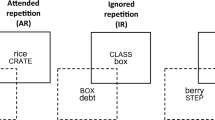Abstract
Forty-eight undergraduates made lexical decisions about emotionally aversive and nonemotional words. Emotionally aversive target words were preceded either by an emotionally aversive prime word, a nonemotional but semantically related prime or a nonemotional and semantically unrelated prime. Nonemotional targets were preceded by nonemotional primes which were either semantically related to targets, unrelated, or neutral (strings of Xs). Primes were presented for 50 ms to one group of 16 participants, 500 ms to a second group and 1250 ms to a third group. Measurement of lexical decision time showed significant semantic primary effects for nonemotional targets, and these were not influenced by prime duration. Priming effects for emotionally aversive targets due both to emotional and nonemotional relatedness of primes and targets were also found and these effects were not influenced by prime duration. The results are considered to be consistent with Bower’s (1981) associative network theory of memory, and possible clinical implications for explaining spontaneous panic attacks and the incubation of anxiety are discussed.
Similar content being viewed by others
References
Becker, C.A. (1980). Semantic context effects in visual word recognition: An analysis of semantic strategies.Memory and Cognition, 8, 6, 493–512.
Bower, G. (1987). Commentary on mood and memory.Behaviour Research and Therapy, 25, 6, 443–456.
Bower, G.H. (1981). Mood and memory.American Psychologist, 36, 129–148.
Broadbent, D.E. and Gregory, M. (1967). Perception of emotionally toned words.Nature, 215. 581–584.
Clark, D.M. (1986). A cognitive model of panic.Behaviour Research and Therapy, 24, 461–470.
Clark, H.H. (1973). The language-as-fixed-effect fallacy: A critique of language statistics in psychological research.Journal of Verbal Learning and Verbal Behavior, 12, 335–359.
Collins, A.M. and Loftus, E. (1975). A spreading-activation theory of semantic processing.Psychological Review, 82, 407–428.
Fischler, I. and Goodman, G.O. (1978). Latency of associative activation in memory.Journal of Experimental Psychology: Human Perception and Performance, 4, 3, 455–470.
Forster, K.I. (1978). Accessing the mental lexicon. In E. Walker (Ed.),Explorations in the biology of language. Montgomery VT: Bradford Books.
Kemp-Wheeler, S.M. and Hill, A.B. (1987). Anxiety responses to subliminal experience of mild stress.British Journal of Psychology, 78, 365–374.
Kucera, H. and Francis, W.N. (1967).Computational analysis of present-day American English. Rhode Island: Brown University Press.
Meyer, D.E. and Schvaneveldt, R.W. (1971). Facilitation in recognising pairs of words: Evidence of a dependence between retrieval operations.Journal of Experimental Psychology, 90, 2, 227–234.
Meyer, D.E., Schvaneveldt, R.W. and Ruddy, M.G. (1975). Loci of contextual effects on visual word recognition. In P.M.A. Rabbit and S. Dornic (Eds.),Attention and performance, Vol. 5. London: Academic Press.
Neely, J.H. (1977). Semantic priming and retrieval from lexical memory: Roles of inhibitionless spreading activation and limited-capacity attention.Journal of Experimental Psychology: General, 106, 226–254.
Osgood, C.E., Suci, G.H. and Tannenbaum, P.H. (1957).The measurement of meaning. Urban, Illinois: University of Illinois Press.
Posner, M.I. and Snyder, C.R.R. (1975). Attention and cognitive control. In R.L. Solso (Ed.),Information processing and cognition. The Loyola Symposium. New York: Wiley.
Postman, L. and Keppel, G. (1970).Norms of word association. New York: Academic Press.
Quillian, M.R. (1967) Word concepts: A theory and simulation of some basic semantic capabilities.Behavioral Science, 12, 410–430.
Warren, R.E. (1977) Time and the spread of activation in memory.Quarterly Journal of Experimental Psychology: Human Learning and Memory, 3, 458–466.
Author information
Authors and Affiliations
Rights and permissions
About this article
Cite this article
Hill, A.B., Kemp-Wheeler, S.M. The influence of context on lexical decision times for emotionally aversive words. Current Psychology 8, 219–227 (1989). https://doi.org/10.1007/BF02686750
Accepted:
Issue Date:
DOI: https://doi.org/10.1007/BF02686750




